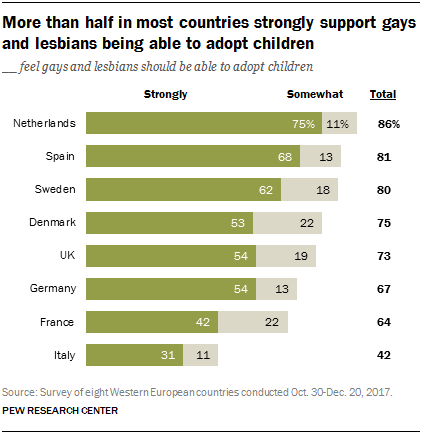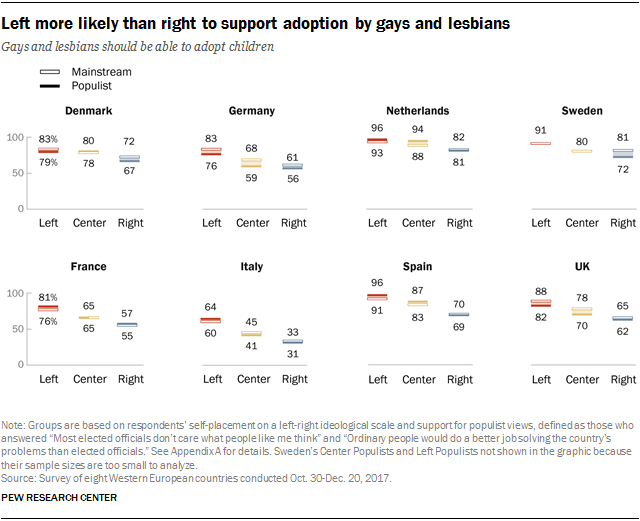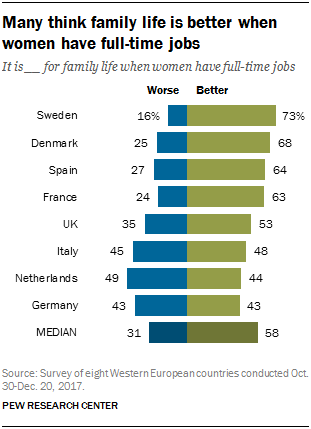Most people across Western Europe support allowing gays and lesbians to adopt children, and many also believe family life is better when women have full-time jobs. While these opinions are fairly widespread, the ideological left is more likely to hold these views than the right. Traditional left-right ideology strongly divides people’s views on gay and lesbian adoption across much of Western Europe, with populist sympathies playing only a limited role.6
Wide support for allowing gays and lesbians to adopt children
 In seven of the eight countries surveyed, about two-thirds or more of the public believes gays and lesbians should be able to adopt children. And in six of these countries, more than half feel this way strongly. Italy is a notable exception. There, roughly half (52%) oppose allowing gays and lesbians to adopt children, and 42% strongly oppose it.
In seven of the eight countries surveyed, about two-thirds or more of the public believes gays and lesbians should be able to adopt children. And in six of these countries, more than half feel this way strongly. Italy is a notable exception. There, roughly half (52%) oppose allowing gays and lesbians to adopt children, and 42% strongly oppose it.
Left-right ideology influences how people feel about the issue, for both populist groups and those in the mainstream. The differences between left and right are generally in the level of support, not the direction of it: Outside of Italy, all groups on both the left and the right support adoption by gays and lesbians, but support is more widespread on the left.
Across the region, there is a clear left-right divide on this issue: In every country, the Left Mainstream are more likely than the Right Mainstream to support adoption by gays and lesbians. The same is true for Left Populists compared with Right Populists. For example, in the UK, 88% of the Left Mainstream say gays and lesbians should be able adopt children, while 65% of the Right Mainstream agree. There is a similar 20-percentage-point difference between Left Populists and Right Populists. Groups on the left are also much more likely to express strong support than those on the right. Continuing the example of the UK, 68% of Left Populists and 74% of the Left Mainstream strongly support adoption by gays and lesbians, compared with 38% of Right Populists and 43% of the Right Mainstream.

Less regional consensus when it comes to views on gender roles
 A median of 58% across Western Europe say it is better for family life when women have full-time jobs. In Sweden, more than half (53%) feel this way strongly. Italy, Germany and the Netherlands are more divided. In these countries, more than four-in-ten say family life is worse when women have full-time jobs.
A median of 58% across Western Europe say it is better for family life when women have full-time jobs. In Sweden, more than half (53%) feel this way strongly. Italy, Germany and the Netherlands are more divided. In these countries, more than four-in-ten say family life is worse when women have full-time jobs.
This issue is not as ideologically divisive as adoption by gays and lesbians, but there are still significant differences between the left and the right in five countries. For example, roughly three-quarters of Spaniards who place themselves on the left say it is better for family life when women have full-time jobs, including 77% of Left Populists and 72% of the Left Mainstream. Fewer on the right take this view, though majorities of both Right Populists (64%) and the Right Mainstream (58%) agree.
There are minimal differences between those with populist views and those in the mainstream. However, in Denmark, Germany and the UK, the Left Mainstream are more likely than Left Populists to say it is better for family life when women have full-time jobs. In the UK, for instance, nearly seven-in-ten in the Left Mainstream (68%) say family life is better when women have full-time jobs, compared with 51% of Left Populists. Only in Denmark is there a significant difference between groups on the right.



 Explore traditional and populist party support in Western European countries
Explore traditional and populist party support in Western European countries Country-specific data on news media and political attitudes
Country-specific data on news media and political attitudes